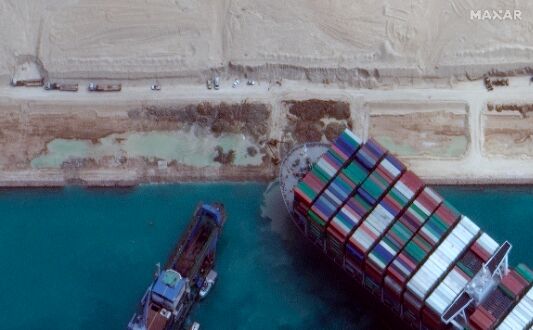Premature relief

Well, the week-long fiasco at the Suez Canal is finally over. The massive 400 m cargo ship Ever Given has been refloated and is now undergoing inspections in a part of the canal where it won't cause blockages. Egyptian canal authorities are ecstatic. Egyptian President Abdel Fatah al-Sissi has hailed the moment as some kind of national victory. For all the excitement and memes that have continued to greet this news of the Ever Given finally being 'unstuck', there are obviously issues that remain. For one, after the jubilation dies down, there is a huge backlog of ships to work through. On either side of the canal, there are at least 350 or so ships waiting to make the transit. Even once these ships are cleared for transit over the coming days and weeks, the snags and delays all across the global supply chain are already piling up. Around 30 per cent of the world's shipping container volume passes through the canal every single day. Even products and companies that do not directly rely on the canal will be facing snags as parts of various related supply chains are suddenly hitting delays as well. Then, there is the fact that the ships being rapidly cleared across the channel will create fresh congestions at their destination ports. There are also fears regarding the ships that decided to take a wider alternative route around the Horn of Africa where they run into increased risks of coming across pirates. While there are natural preparations in place to combat the usual activities of piracy in the region, an increase in cargo shipping over the next few weeks and months will make the whole process harder to monitor and guard against. Next, we have the reinsurance industry which is also likely to take a massive hit to its profits as they lose hundreds of millions of Euros, according to Fitch Ratings. Coming at a time when reinsurance agencies worldwide are already on the hook for raging natural disasters such as the winter storms in the US and floods in Australia, the price for marine reinsurance is set to shoot up for the immediate future. All in all, there is an image of a tightly-wound system coming apart at the seams as smaller problems cascade into bigger ones. But this is the nature of our current systems of commerce, one that is even more amplified as our maritime trade comes to be increasingly reliant on a series of strategic chokepoints. For nations like China, which relies on these chokepoints for a majority of its iron and oil imports, any fluctuations are a major cause for concern. In short, this makes such chokepoints rather significant geopolitical flashpoints. Many of these chokepoints including the Suez itself have seen plenty of conflicts happen around them and have even faced shutdowns. If we are to insist on using these narrow chokepoints as vital arteries for the systems of global trade, we may at least be better served by creating collective systems and international authorities to oversee them if not govern them. This is pretty much what James Stavridis, retired US admiral and former supreme allied commander of NATO had to say on the matter when he wrote for Time magazine recently. Of course, there is one party at least that has found some cause for celebration and snide remarks. As the rest of the world frets over what delays in Ikea furniture, instant coffee and bobbleheads would do to most of us in the coming months, Russia has found time to do the whole 'I told you so routine'. Russia's energy minister recently made rather pointed remarks about how the whole Suez disaster made a good case for global trade seeking alternative routes. Obviously, Russia has a trade route in mind that it would very much like to offer as an alternative — the Northern Sea Route. The Arctic ocean route through to Asia is expected to shave-off nearly 4,000 miles off the alternative Suez Canal route when it is fully operational. Russia, which has been very active in making claims in the Arctic region stands to gain tremendously if global trade routes between Europe and Asia start shifting northward. All in all, the Ever Given jam may be over but it has set off a change of events that may force a rethink of the fragile ways we conduct our all-important global trade.



